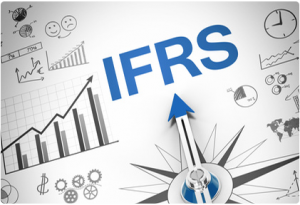In this blog post, Balaji AG, a qualified ACA, ICWA, ACS and CIMA (UK) Industry Consultant and a CFO of a Listed Company for over five years, and who is currently pursuing his Diploma in Entrepreneurship Administration and Business Laws from NUJS, Kolkata, analyses the International Financial Reporting Standards as a legal source in India.
Background
Companies Act, 1956/2013 provides the basic requirements relating to financial reporting of all companies incorporated under the act. Under the Companies Act 1956, every profit & loss account and balance sheet shall comply with the accounting standards. Accounting standards are issued by the Institute of Chartered Accountants of India (ICAI). Securities and Exchange Board of India (SEBI) protects the investors and regulates the securities market. Listed companies are required to comply with the various provisions of the listing agreement issued by SEBI. Listing agreement provides for compliance with accounting standards issued by ICAI.
The Insurance Regulatory and Development Authority (IRDA) regulates financial reporting requirements of Insurance Companies. Insurance Companies and their auditors are required to comply with the requirements of the IRDA regulations of 2002 “Preparation of Financial Statements and Auditor’s Report of the Insurance Companies”. IRDA regulations require compliance with the accounting standards issued by ICAI.
The Reserve Bank of India (RBI) is the central bank of India. The Banking Regulation Act, 1949 empowers the RBI to regulate the financial reporting of entities in the financial sector like banks, financial institutions, etc. RBI has issued circulars requiring banks to comply with the accounting standards issued by ICAI.
From the above, it is clear that the accounting standards issued by ICAI need to be complied with when preparing financial reporting statements of incorporated companies, banks, insurance companies, etc.
ICAI set up the Accounting Standards Board (ASB) in 1977 to prepare accounting standards. ICAI became one of the associate members of the International Accounting Standards Committee (IASC) in June 1973. ICAI also became a member of the International Federation of Accountants (IFAC) since its inception in October 1977. While formulating accounting standards in India, the ASB considers International Financial Reporting Standards (IFRS) and tries to incorporate them in the accounting standards issued by it to the extent relevant, in the light of laws, customs, practices, business environment prevalent in India
Convergence Process of IFRS in India
India opened up its doors for international investments to flow in the year 1991. As businesses expand across borders, they are increasingly recognizing the benefits of having a commonly understood financial reporting framework, supported by strong globally accepted standards. The benefits are numerous and include:
- Greater comparability of financial information for investors;
- Greater willingness on the part of investors to invest across borders;
- Lower cost of capital;
- Higher economic growth etc.,
However, before these benefits can be fully realized, there must be greater convergence to a single set of globally accepted high-quality accounting standards. International convergence is a goal that is embraced in the mission of the International Federation of Accountants (IFAC) and shared by IFAC members.
ICAI being a member of IFAC since its inception has recognized in its Preface to the Statements of Accounting Standards that:
“ICAI, being a full-fledged member of the International Federation of Accountants (IFAC), is expected, inter alia, to actively promote the International Accounting Standards Board’s (IASB) pronouncements in the country to (or “intending to”) facilitate global harmonization of accounting standards. Accordingly, while formulating the Accounting Standards, the ASB will give due consideration to International Accounting Standards (IASs) issued by the International Accounting Standards Committee (predecessor body to IASB) or International Financial Reporting Standards (IFRSs) issued by the IASB, as the case may be, and try to integrate them, to the extent possible, in the light of the conditions and practices prevailing in India”.
The accounting standards issued by ICAI are by and large in conformity with the IFRSs. The Council of ICAI at its 259th Meeting held in May 2006 expressed the view that the IFRS may be adopted in totality at least for listed and large entities. The Accounting Standards Board of ICAI, at its 127th meeting held in August 2006 considered the matter and supported the council’s view that there would be several advantages of converging with IFRS.
The Board decided to constitute a Task Force to prepare the Concept Paper on Convergence with IFRSs with the objective of exploring:
- the approach for achieving convergence with IFRSs, and
- (ii) laying down a road map for achieving convergence with IFRSs to (or “intending to”) make India IFRS-compliant.
Under the concept paper issued in October 2007, the convergence strategy proposed was that IFRSs should be adopted for public interest entities such as listed entities, banks and insurance entities and large-sized entities from the accounting periods beginning on or after the 1st of April 2011. In respect of entities other than public interest entities (termed as ‘small and medium-sized entities’ (SMEs)), a separate standard for SMEs may be formulated based on the IFRS for Small and Medium-sized Enterprises when finally issued by the IASB, after modifications, if necessary.
Convergence proposed under the concept paper means adoption of IFRS with additional disclosures that are considered necessary for the local environment or removal of an optional treatment, where necessary.
The format of converged accounting standard proposed under the concept paper was that IFRSs should be issued as Indian ASs, which would be considered IFRS-equivalent. To facilitate reference to the existing Indian Accounting Standards, along with the IFRS number, in the brackets, the existing Accounting Standard number may also be given.
ICAI made a public commitment of convergence to IFRS before the 31st of December 2011. This announcement leads to the government announcing the same commitment of converging by the end of 2011 a year later from the announcement by the ICAI. Even during its inception, the aim of convergence was not to fully conform to IFRS but rather to modify the standards for acclimatization to India’s business environment. Factors such as the legal and regulatory environment, economic conditions, industry preparedness and practice as well as the removal of some options permitted under IFRS were implemented to create a sense of compromise between IFRS and the way business is done in India.
IFRS converged Indian Accounting Standards Implementation
Indian Accounting Standards (IND-AS) were issued by the Accounting Standards Board of ICAI. The IND- AS are named and numbered in the same way as the corresponding International Financial Reporting Standards(IFRS). National Advisory Committee on Accounting Standards (NACAS) constituted under Section 210A of the Companies Act, 1956 recommend these standards to the Ministry of Corporate Affairs (MCA).
The Ministry of Corporate Affairs notified these standards on February 25, 2011. The Press note issued in this regard indicated “In pursuance of G-20 commitment given by India, the process of convergence of Indian Accounting Standards with IFRS has been carried out in Ministry of Corporate Affairs through the wide-ranging consultative exercise with all the stakeholders. Thirty-five Indian Accounting Standards converged with the International Financial Reporting Standards (henceforth called IND-AS) are being notified by the Ministry and placed on the website. These are: IND ASs 1, 2, 7, 8, 10, 11, 12, 16, 17, 18, 19, 20, 21, 23, 24, 27, 28, 29, 31, 32, 33, 34, 36, 37, 38, 39, 40, 101, 102, 103, 104, 105, 106, 107 and 108. The Ministry of Corporate Affairs will implement the IFRS converged Indian Accounting Standards in a phased manner after various issues including tax related issues are resolved with the concerned Departments. It would be ensured that the implementation of the converged standards in a phased manner is smooth for the stakeholders. The Ministry will notify the date of implementation of the IND AS at a later date”.
2013 saw the Indian government adopting a new Companies Act to facilitate the various new provisions convergence to IFRS required. To resolve issues of tax, the Ministry of Finance drafted Tax Accounting Standards to account for the conflicts between accounting and taxation.
Central Government through notification dated 16 February 2015, in exercise of the powers conferred by Section 133 read with section 469 of the Companies Act, 2013 and sub-section (1) of Section 210A of the Companies Act, 1956, in consultation with the National Advisory Committee on Accounting Standards, has issued the Companies (Indian Accounting Standards) Rules, 2015 which lay down a roadmap for companies other than insurance companies, banking companies and non-banking finance companies (NBFC) for implementation of IND-AS converged with IFRS. The Rules would come into force from the 1st day of April 2015.
| Financial year | Mandatorily Applicable To |
| 2016-17 | Companies (listed and unlisted) whose net worth is equal to or greater than 500 crore INR |
| 2017-18 | Unlisted companies whose net worth is equal to or greater than 250 crore INR and all listed companies or companies in the process of listing |
| 2018-19 onwards | When a company’s net worth becomes greater than 250 crores INR
|
It is also applicable to holding, subsidiaries, joint ventures, or associates of companies covered above from the respective year.
On the 18th of January 2016, the MCA issued a road map for the applicability of IND-AS for banking companies, Insurance Companies, and NBFCs. Banks, Financial Institutions, Insurance companies and NBFCs with a net worth of over Rs. 500 crores are required to prepare financial statements under the IND-AS for accounting periods beginning from 1st April 2018.
 Serato DJ Crack 2025Serato DJ PRO Crack
Serato DJ Crack 2025Serato DJ PRO Crack











 Allow notifications
Allow notifications


